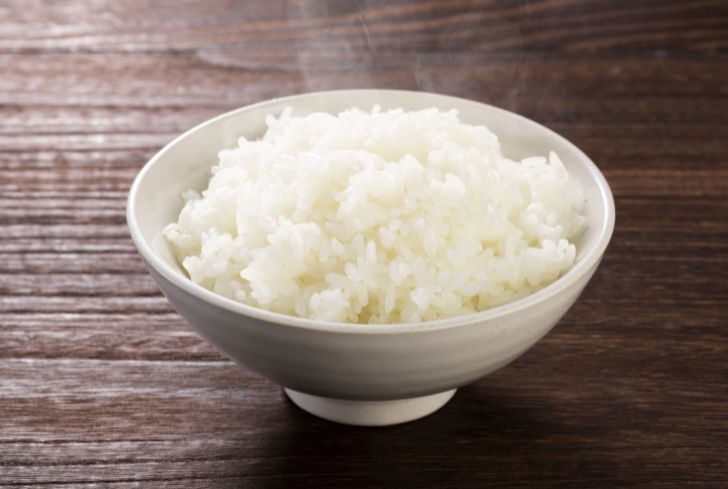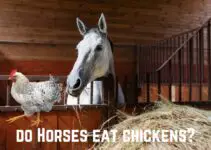Rice is a staple diet across the whole world for humans, as well as a good, nutritious source for animals. It is readily available and can easily be harvested throughout the year – which is perfect in case you have farm animals.
Goats, like a lot of other herbivores, can eat rice and various varieties of it. It is safe to feed rice to a goat and along with it will come many nutritional benefits. Now, we will discuss how rice benefits your goats as well as many other alternatives in case you don’t have them.
Contents
Is Rice Good For Goats?
Rice makes any sort of diet a nutritious one. Being rich in several healthy bodily supplements like Vitamin E, iron, carbohydrates, folate, and calcium, one can imagine what good product rice is. The only thing rice is relatively low on is fiber.
The tricky part is to understand how much rice is good for your goat as they need some nutrients in a higher amount as compared to other ones. Vitamins in rice are useful for a goat’s growth and reproductive health while minerals such as calcium are crucial for goats that are lactating. It prevents the goat from catching parturient paresis – a dangerous illness that is also known as milk fever.
Health Benefits of Feeding Rice to Goats
Goats can eat all types of rice but changing from normal white rice to its wild and brown alternatives is also a great idea as they too have their own nutritional values. They are also healthier as they are not as processed as white rice which is almost completely drained of its nutrients.
Sprouted rice grains which are 100% whole grains also help in digestion and increasing milk production. The babies that are developing also benefit from this as it helps maintain their good health!
The only precautions you need to take while feeding rice to goats is to remember not to overfeed rice to your goats and to not make it their primary diet. If you take care of these two things, you can have rice as part of your goat’s diet.
Another thing you can remember is to not introduce rice suddenly as a part of their diet if they are not used to consuming it.
Goats have three stomachs – one of which is solely to absorb nutrients. Due to the way this stomach absorbs nutrients, it is important that small amounts of rice need to be gradually added to your goat’s diet instead of giving a huge amount in one go!
It can also lead to bloating and digestive issues as not every being have the same system and you also need to enquire if your goat has certain bodily issues.
Can Goats Eat Raw Rice?
Rice is beneficial for goats whether it is raw or cooked. Goats have a few essential nutrients that are required in their diet and rice covers a lot of them.
There is a belief that uncooked rice will swell up a goat’s belly and eventually have it explode since rice swells in warm water. However, that is just a myth and it is scientifically not possible since rice, upon reaching a goat’s belly just like any other food, will start digestion right away.
In fact, when doing a nutritional comparison between cooked and raw rice, you would see that the uncooked product has far more nutrients than one that goes through a lot of processing to reach its cooked stage.
The washing, cooking, and boiling deprives the rice of its nutrients and hence, is a less healthy version of raw rice!
Raw rice is safe to eat for goats and the only time it proves dangerous is if you feed them too much of it. No swelling or explosion of stomachs would happen, but the germs might prove dangerous. It does not taste as great, so it is unlikely that your goat would consume a lot of it.
Is Rice Pudding Safe for Goats?
Rice pudding is a popular dessert that is made by cooking rice in milk or water with sugar, raisins, cinnamon, and vanilla as its main ingredients. According to the nutrient breakdown of rice pudding, the sugar in 100 grams of rice pudding will be roughly 9 grams which is too much for your goat’s consumption.
On top of that, the sugar that you eat and would probably make rice pudding out of is not the same as the natural sweetness from sugarcanes, which is safe for goats. It is processed and goes through a lot of things that can prove to be harmful to animals.
Hence, though rice may be a safe and healthy option for your goat, avoid giving rice pudding to your goat.
Can Goats Eat Brown Rice?
When we talk of rice being healthy for goats, we need to remember that the more natural something is, the healthier it is for an animal. Brown rice along with wild rice is the safest and healthiest option for your goat’s diet. They are not processed like white ones, and hence have all the required nutrients needed for a goat’s well-being.
Brown rice is far more advantageous as it has a lower fat content, a lower calorie count, but most importantly, is rich in fibers – which is normally not present in rice. The nutritional value remains intact as well because it is unprocessed. It is not just an alternative to your rice, but also the healthiest possible option for your goat.
Again, the only thing you need to keep in mind is to not overfeed your goat brown rice.
Can Goats Eat Cooked Rice?
Since goats can consume and digest raw rice easily, there is no doubt that cooked rice would also be easy to eat and digest for them. It has a softer texture, fills up the belly quickly, is more in quantity, and is extremely easy to digest. Cooked rice is perfect for when you have to feed a lot of mouths.
The calorie count of cooked rice is also far lesser than that of raw rice – which means that your goat can easily consume more of it without putting on unnecessary weight.
Although uncooked rice has more nutrients in store and being closer to its natural state is always more advantageous for animals, cooked rice will be easy for them to eat.
Here are a few things to remember when feeding your goat cooked rice:
- After your rice has been cooked, remember to give it a good 20-25 minutes before serving your goat. You do not want to burn the insides of your goat’s mouth as they have no control. Hence, remember to cool down your cooked rice before serving it to your goat.
- Never add any sort of spices or ingredients to make your rice tastier. Plain, cooked rice – with no additional flavors (not even salt) is suitable.
- Remember to never feed your goat rice that has been fried in any kind of oil. Animals, especially herbivores, do not take processed things like spices and oil well which may cause them an upset tummy.
Can Goats Eat Rice Krispies?
Rice Krispies are breakfast cereals made out of crisped rice. Since Krispies come from a company that processes them to make them, they should not be fed to your goat and other animals in large amounts.
The high sodium and fat present in the snack may cause your goat to have stomach problems if fed in a huge amount. However, if fed safely and once in a while, it can prove to be a great snack or reward for your goat.
Goats love to try all types of food and since Krispies are liked by humans, it is natural that it is tasty and will also be loved by your goat.
Hence, to look at it from its positive aspects, Rice Krispies include vitamins, iron, niacinamide, and folic acid as well which will all be good for your goat upon consumption!
They are also breakfast items. So, they are tried to be made lighter to digest than other processed foods.
In all, they can be fed as a snack for your goat to enjoy as long as you are keeping in mind the amount of Krispies they have had.
Final Thoughts
Rice is a wonderful grain just as a goat is an amazing and cuddly animal. Being ruminant herbivores, goats eat rice well and will also be a healthy addition to their meal plans.
The best thing about rice being an available food option for your goat other than the fact that it is easily available and harvested is also the variety of ways you can feed it to your goat. The variations will keep your goat who likes to try new food happy as well as give you lots of ways in which you can balance out your goat’s diet.
Just remember the points we mentioned and do not introduce rice suddenly into the diet plan. Also, try to pick brown and wild rice instead of its processed alternative.







